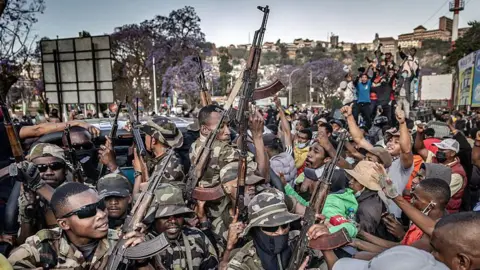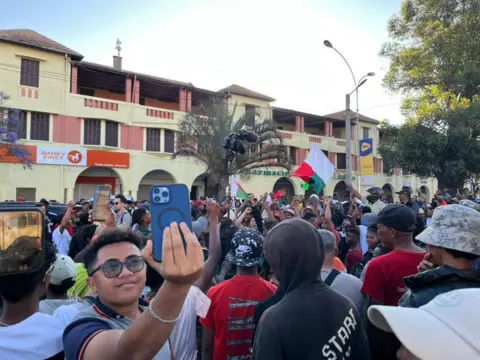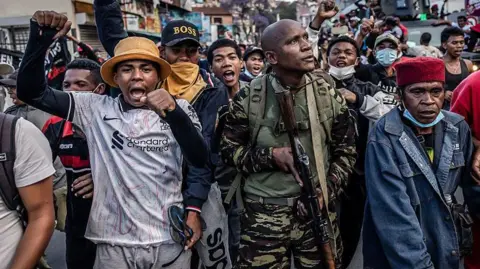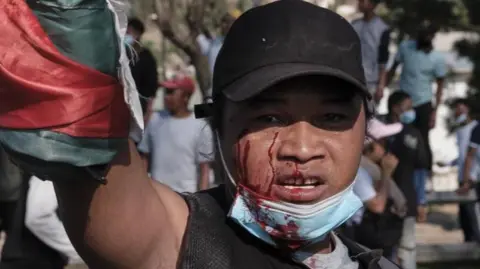Sammy Awamireporting from Madagascar and
Farouk Chothia
 AFP via Getty Images
AFP via Getty ImagesThe office of Madagascar’s President Andry Rajoelina has said an attempt to seize power illegally and by force is under way in the country.
Hours later, an army unit known as CAPSAT claimed that it had taken over the leadership of the military command, and was now in control of all the armed forces – land, air, and naval.
This is the same unit that played a crucial role in the 2009 Malagasy political crisis, which helped Rajoelina rise to power.
Madagascar was first hit by youth-led protests on 25 September against water and power cuts, but they have escalated to reflect wider dissatisfaction with Rajoelina’s government over high unemployment, corruption, and the cost-of-living crisis.
Rajoelina’s whereabouts are unclear, but in a statement he said “there is an attempt to seize power at this time in the territory of the Republic, in complete violation of the Constitution and democratic principles,” in a translation.
He condemned “in the strongest possible terms” what he called an attempt to destabilise the country. He also called on all of the nation’s key forces to unite in defending the constitutional order and national sovereignty.
CAPSAT said it had appointed a new army chief of staff, Gen Demosthene Pikulas, according to a statement issued on its Facebook page.
AFP news agency reports armed forces minister Manantsoa Deramasinjaka Rakotoarivelo has accepted the appointment.
“I give him my blessing,” the minister was quoted as saying at a ceremony to install Gen Pikulas to the post.
Protesters have gathered at the main square in the capital, Antananarivo, for the second consecutive day.
This is a significant development, as they had failed to reach May 13 Square, the focal point of previous uprisings, until now.
A protester told the BBC that they had “finally conquered May 13 Square – the Square of Democracy”.
“We’re happy and relieved. It’s a great victory. We won’t stop the struggle until President Rajoelina resigns,” the protester added.

The success of the demonstrators came after they received unexpected support from CAPSAT on Saturday, when some of its troops left their barracks to join the demonstration.
CAPSAT had condemned the use of force against protesters by other security units.
There were reports of a shoot-out at a CAPSAT camp on Sunday, following similar reports on Saturday.
CAPSAT said one soldier was shot by gendarmes on Saturday, and died.
Air France said it had suspended its flights to Antananarivo until at least Tuesday because of the security situation.
The African Union said it was deeply concerned by the latest developments in Madagascar, and urged sides to resolve the crisis through dialogue.
The protest movement, known as Gen Z Mada, has been rallying support mainly through social media, posing the biggest challenge to Rajoelina since his re-election in 2023.
Some of the protesters have been wearing T-shirts and holding banners with a symbol – a skull with a straw hat from the Japanese manga series “One Piece” – used by youth-led demonstrators in other countries, including Indonesia and Peru.
On Saturday, a statement from the presidency had assured the nation that Rajoelina and the new prime minister – an army general he appointed last week – were in control of the situation.
 AFP via Getty Images
AFP via Getty ImagesUN human rights chief Volker Türk previously urged security forces to stop using “unnecessary and disproportionate force” to quell the unrest. He said at least 22 people were killed and 100 others injured.
Rajoelina disputed the figure last week, saying there were 12 confirmed deaths and “all of these individuals were looters and vandals”.
Madagascar has been rocked by multiple uprisings since it gained independence in 1960, including mass protests in 2009 that forced then-President Marc Ravalomanana to step down and saw Rajoelina come to power.
Rajoelina governed for four years and then returned to power after the 2018 election.
Despite its natural resources, Madagascar is one of the poorest countries in the world, with 75% of people living below the poverty line, according to the World Bank.
Only about one-third of Madagascar’s 30 million people have access to electricity, according to the International Monetary Fund (IMF).
 EPA / Shutterstock
EPA / ShutterstockMore on Madagascar’s crisis:
 Getty Images/BBC
Getty Images/BBC

